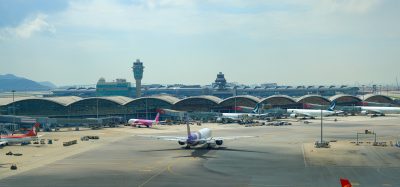Experts address UK airport congestion
- Like
- Digg
- Del
- Tumblr
- VKontakte
- Buffer
- Love This
- Odnoklassniki
- Meneame
- Blogger
- Amazon
- Yahoo Mail
- Gmail
- AOL
- Newsvine
- HackerNews
- Evernote
- MySpace
- Mail.ru
- Viadeo
- Line
- Comments
- Yummly
- SMS
- Viber
- Telegram
- Subscribe
- Skype
- Facebook Messenger
- Kakao
- LiveJournal
- Yammer
- Edgar
- Fintel
- Mix
- Instapaper
- Copy Link
Posted: 19 March 2015 | Katie Sadler, Digital Content Producer, International Airport Review
Experts have today revealed a programme to address UK airport congestion and capacity without a reliance on new airport building and expansion. The OR-MASTER Programme Grant (Mathematical Models and Algorithms for Allocating Scarce Airport Resources) has been established in response to growing concerns over airport capacity, rising demand, and the impact of congestion on both […]


Experts have today revealed a programme to address UK airport congestion and capacity without a reliance on new airport building and expansion.


The OR-MASTER Programme Grant (Mathematical Models and Algorithms for Allocating Scarce Airport Resources) has been established in response to growing concerns over airport capacity, rising demand, and the impact of congestion on both the travelling public and the air transport industry. The £2.8 million project will be managed by a team at Lancaster University Management School, working with Computing, Science and Mathematics researchers at the University of Stirling. The research has been funded by the EPSRC (Engineering and Physical Sciences Research Council).
Work carried out will address efficient ways to schedule flights and develop and test new models and solution algorithms that take into account all the factors involved in the allocation of flight ‘slots’: individual airport operations, networks of airports, airline operations, air traffic management systems, airport authorities, civil aviation authorities, airlines and the travelling public.
Project lead, Professor Konstantinos G. Zografos at Lancaster University Management School, said: “Existing approaches to airport slot allocation do not consider all the real-world complexity involved. Therefore, there is room to improve airport capacity utilization which will benefit airlines, airports and the travelling public.
“It will support policy makers and air transport decision makers here and overseas in getting to grips with airport congestion and in optimally allocating scarce airport resources. The air transport industry generally will benefit from acquiring a better understanding of the trade-off between capacity utilization, and passenger and airline schedule delays.”
Professor Kevin Glazebrook from Lancaster University Management School also commented: “There is an international research effort to find solutions to a problem that’s high on the agenda for air transport decision and policy makers globally. With its reputation in Operational Research, the UK should be leading the way in meeting this challenge, and the new funding will help us do that.”
The project at the University of Stirling will be led by Professor Edmund Burke, current Senior Deputy Principal and Deputy Vice-Chancellor. Professor Burke said: “It is recognised that as economies grow and as the need for air travel grows, greater capacity at airports is required. We are delighted to receive this grant, which will investigate – from a mathematical and computational perspective – whether capacity management is being realised as efficiently and effectively as possible.”
The OR-MASTER project will take place over a six year period collaborating with a host of organisations internationally that will provide both insight and expertise. Organisations involved include the National Air Traffic Services (NATS); Eurocontrol (managing air traffic across Europe); Park Air Systems; KLM Air France; Zurich Airport and Athens International Airport; the research organisations linked to the national air navigation services for Italy and Spain (SICTA and CRIDA); SESAR (Single European Sky research body); the Airport Services Association; Goldair Handling; ACI Europe (Airports Council International); the HALA! SESAR network of leading researchers in Europe working in the area of Air Traffic Management automation; NEXTOR II (National Centre of Excellence for Aviation Operations Research); the MIT International Centre for Air Transport Research (MIT-ICAT) in the USA; and DLR, the German Airspace Research Centre.
EPSRC Chief Executive Professor Philip Nelson commented on the upcoming programme: “Put simply, world-class projects like this help to make the UK the best place in the world to research, discover and innovate. This investment will fuel the UK’s technological progress, help address the challenges of today and tomorrow, and contribute to a strong economy.”
















